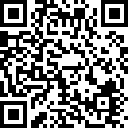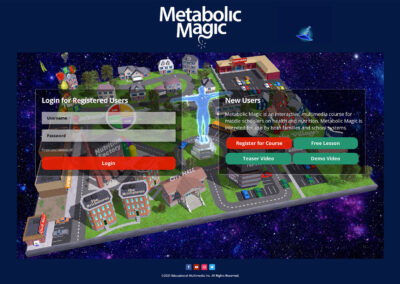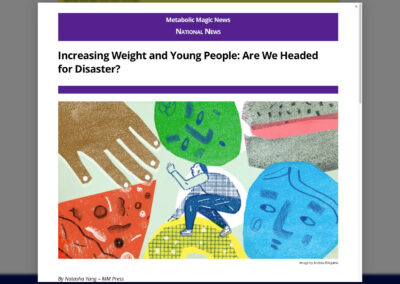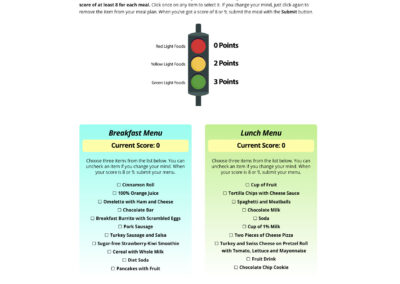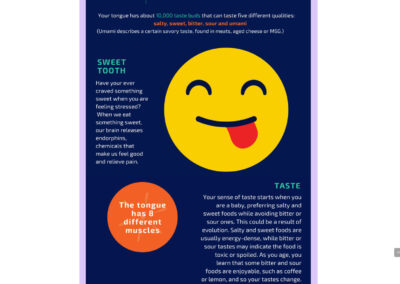
About Metabolic Magic
Metabolic Magic, a web-based educational program centering on nutrition and fitness, goes far beyond the basics of healthy eating. By empowering youth to care for their whole selves while addressing the powerful environmental influences on health and well-being, Metabolic Magic aims to empower students to become change agents among their peers, families, and communities.
History of the Project
Metabolic Magic was conceived 15 years ago through a multi-year grant from the Missouri Foundation for Health. As we grew to know the students involved in the grant, we learned that their dietary habits had little to do with how much they understood the basics of good nutrition; in fact, the majority understood basic nutritional concepts such as balancing calories consumed and expended. After we talked to the students about diverse topics such as their meals, neighborhoods, daily activities, and what their parents or guardians did for a living, we grew to understand the enormous impact of environmental obstacles to successfully attaining and maintaining good health and fitness.
Metabolic Magic presents a human ecological framework and recognizes that health goes beyond food and nutrition science. An acknowledgment of the whole person, including their environment, is what shapes our project. We ask and address the important questions; What can young people control within their environment and how can they cope with what they cannot control? How can youth work with others to make changes in their own lives and in their community? In Metabolic Magic, we help young people take on these challenges through lessons on food literacy, creating healthy habits, the mind-body connection of nutrition and fitness, food justice, and more.
Program Overview
Students learn in the online town of Metabolic Magic, a microcosm of society including neighborhoods with different socioeconomic statuses, a school, a clinic, and a town government. In each lesson, or case study, students interact with members of the town and utilize problem-based learning to generate creative solutions to the presenting problem. Through helping Metabolic Magic’s citizens to positively influence their environments, students will gain confidence and motivation to address personal health concerns, while also gaining the knowledge and practical skills to do so successfully. Metabolic Magic provides real-world examples of the characters initiating activities that create healthier communities, families and individuals, inspiring students to see what is possible in their own lives.
Our goal for the future of Metabolic Magic is to continue creating relevant, compelling and inclusive content. The feedback and information gathered from clients and communities through our program evaluation process will be a vital component of this growth.
Program Objectives and Contents
Structure of the program topics
The Metabolic Magic program will educate students using Case Studies, each of which presents a problem to solve in the town of Metabolic Magic. Case Studies begin on the individual level, progress to the family and finally to the community level. Students will encounter a variety of educational tools in each case study, presented through informative and entertaining stories, graphics and videos. They will review the lesson via quizzes and other activities. Additionally, each case study will have a series of supplemental materials, including lesson plans, group activities and mini-interventions. Through these resources, students can engage with additional topics and ideas of how to put their new skills and knowledge into practice within their local communities.
What is a mini-intervention?
As participants of the Metabolic Magic interactive curriculum learn about healthy living, they can put that knowledge into practice through more in-depth projects. The mini-intervention component of the program is an opportunity to utilize this information outside of the classroom and place it into a real-world context.
We believe that young people have the ability to make good choices for themselves; as such, mini-Interventions are designed for students to take ownership of their actions. The mini-intervention guidelines included in the program are projects created by students and their peer groups with the guidance of adults. We also encourage classes to come up with their own mini-interventions! A vital aspect of these projects is that they are initiated by the students: they are the agents of change.
A few examples of mini-interventions include:
- All-out Ad Campaign: Students create a PSA for use in their school, local radio, or television program.
- Meet the Expert: Students plan a school event to have an expert give a talk on an issue related to health.
- Partners in Food and Fitness: Students pair up with younger students to mentor them through activities related to healthy habits.
Outline of Case Study Contents
- Introduction
Students are introduced to the town of Metabolic Magic, the diverse experiences and lifestyles of the townspeople, and the larger topic of health issues we face today. - Macronutrients
Learn about macronutrients, how to build a balanced meal and categorize foods as red, yellow or green light foods. - Micronutrients
Learn about micronutrients and the benefits of physical activity through a storyline about calcium deficiency. - Building Healthy Habits
Learn about building healthy habits through the storyline of one young resident of the town who influences her family. Topics include: How nutrition and fitness affect your body and mind, stress management and goal-setting. - Community Garden
Learn about the food environment and community engagement through a storyline of some young residents creating a community garden in their neighborhood.
